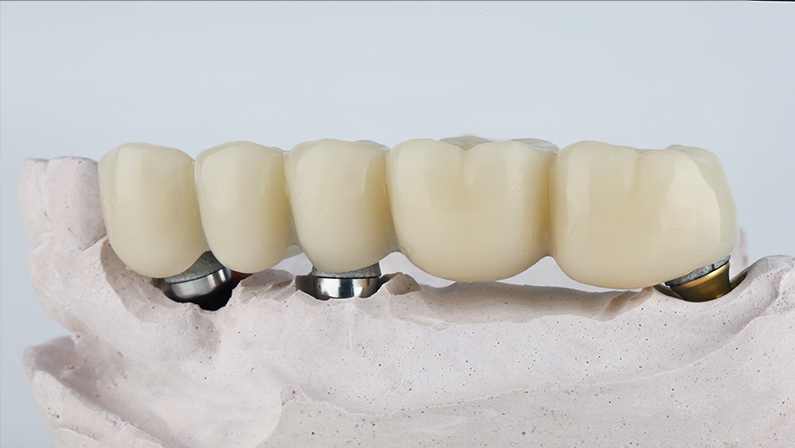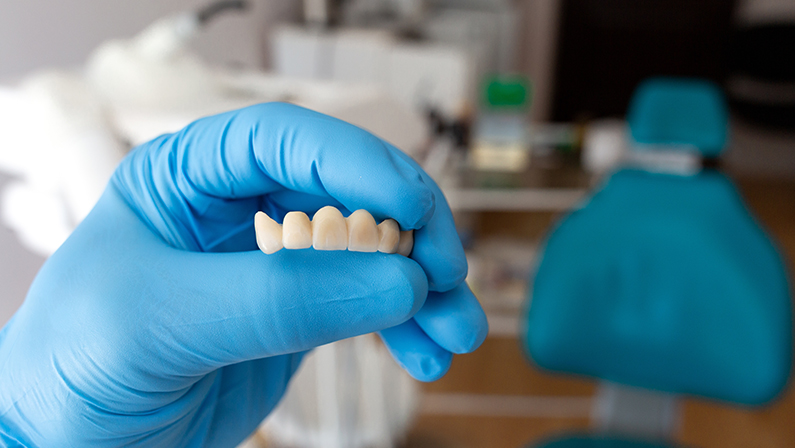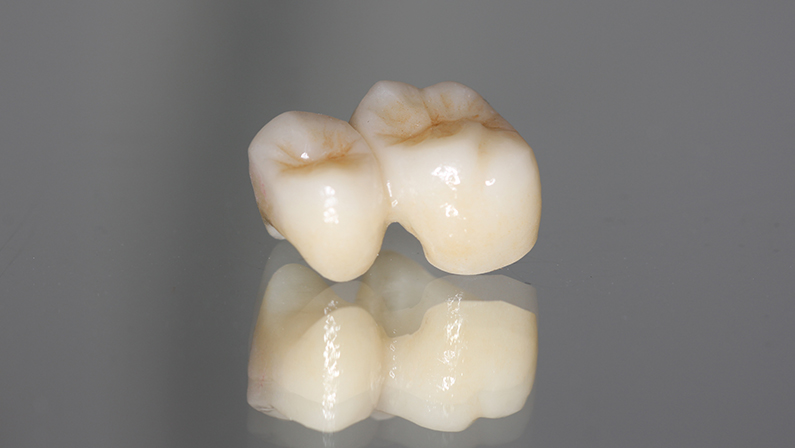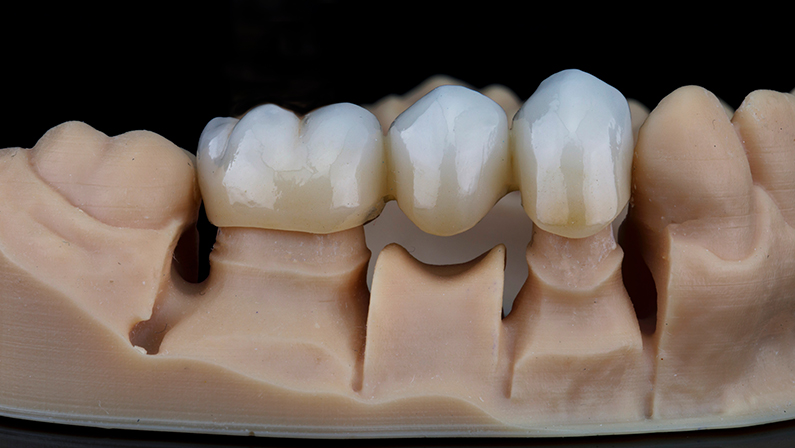A captivating smile not only exudes confidence but is also indicative of good oral health. However, missing teeth can pose functional and aesthetic challenges. Enter dental bridges, a versatile solution that seamlessly fills gaps and restores both form and function.
In this guide, we’ll explore the world of dental bridges, shedding light on their types, benefits, costs, and how they compare to dental implants. This comprehensive overview aims to empower you with the knowledge needed to make an informed decision regarding your smile restoration.
What is a dental bridge?

A dental bridge is a prosthetic device used to replace missing teeth. It consists of one or more artificial teeth (pontics) held in place by dental crowns on adjacent natural teeth or implants. This “bridge” spans the gap left by missing teeth, restoring both function and aesthetics.
Who needs a dental bridge?

Dental bridges are recommended for individuals with one or more missing teeth. They not only enhance appearance but also improve chewing and speaking abilities. Moreover, bridges prevent adjacent teeth from shifting, maintaining proper dental alignment.
What are the benefits of a dental bridge?
A dental bridge provides a transformative solution for those grappling with the challenges of missing teeth. Beyond aesthetic enhancement, it offers a range of compelling benefits, including restored functionality, improved oral health, and a significant boost in confidence, making it an invaluable investment in both appearance and overall well-being.
1. Restored Functionality
Dental bridges restore normal chewing and speaking functions, ensuring you can enjoy your favorite foods without discomfort.
2. Enhanced Aesthetics
They fill gaps left by missing teeth, improving your smile’s appearance and boosting confidence.
3. Maintained Oral Health
By preventing adjacent teeth from shifting, dental bridges help maintain proper dental alignment, reducing the risk of further dental issues.
4. Durability
With proper care, dental bridges can last 10-15 years, providing a long-lasting solution to missing teeth.
Types of Dental Bridges
Understanding the various types of dental bridges is crucial for individuals seeking to restore their smile and oral functionality. From traditional fixed bridges to innovative implant-supported options, each type offers unique advantages, catering to different needs and preferences in the realm of dental prosthetics.
Traditional Fixed Bridge
This is the most common type, involving the creation of crowns for the teeth on either side of the gap, with the pontic(s) in between.
Cantilever Bridge

Similar to the traditional bridge, but in this case, the pontic is supported by a crown on only one side.
Maryland Bridge
Also known as a resin-bonded bridge, it uses metal or porcelain wings bonded to the back of adjacent teeth, offering a less invasive option.
Implant-Supported Bridge
This type is anchored by dental implants rather than adjacent natural teeth, providing superior stability and longevity.
Dental Bridge vs. Dental Implant: Which is Better?

Choosing between a dental bridge and dental implant depends on various factors, including oral health, budget, and personal preference. When faced with the decision of whether to opt for a dental bridge or a dental implant, it’s important to weigh several key factors to determine which option suits your individual needs best.
Oral Health
Dental bridges require the support of adjacent healthy teeth to anchor the prosthetic tooth or teeth in place. If your neighboring teeth are in good condition, a bridge may be a viable choice.
However, dental implants don’t rely on surrounding teeth for support. They are surgically implanted directly into the jawbone, which can actually stimulate bone growth and help maintain overall oral health.
Durability
Dental implants are renowned for their longevity and durability. With proper care and maintenance, they can last a lifetime. In contrast, dental bridges typically have a lifespan of 10 to 15 years, and they may require replacement over time.
Aesthetics
Both bridges and implants can provide aesthetically pleasing results. However, some individuals may find that dental implants offer a more natural look and feel because they don’t involve crowns on adjacent teeth, which can sometimes affect the appearance of those teeth.
Cost
Cost can be a significant consideration. Dental bridges tend to be more cost-effective upfront compared to dental implants. Implants involve a surgical procedure and may require additional components, making them a pricier option. However, it’s essential to consider the long-term cost, as dental implants’ durability can offset their initial expense.
Timeframe
Dental bridges are generally quicker to install as they don’t require the healing time associated with implant surgery. If you need a rapid solution, a bridge may be the better choice. Dental implants, on the other hand, require several months from placement to the final restoration as the implant needs to fuse with the jawbone.
Personal Preference
Your personal preferences and priorities also play a significant role. Some people prioritize a faster solution, while others may prioritize long-term durability. Consult with your dentist to discuss your preferences and assess your oral health to determine which option aligns best with your goals.
There is no one-size-fits-all answer to whether a dental bridge or implant is better, as the choice depends on individual circumstances and priorities. While bridges offer cost-effectiveness and speed, implants provide unparalleled durability and may be more aesthetically appealing. Consulting with a qualified dentist, such as Dr. Saif Shere of Brownstone Dental, will help you make an informed decision that considers your oral health, budget, and personal preferences.
How much does a dental bridge cost?
The cost of a dental bridge varies depending on factors like the type of bridge, material used, and location. On average, it can range from $500 to $1500 per tooth.
How long do dental bridges last?
With proper care and regular dental check-ups, a dental bridge can last between 10 to 15 years or even longer.
How long does it take to recover after a dental bridge procedure?
Recovery time is minimal. Most patients can resume normal activities within a day or two after the procedure.
Choosing the Right Solution for Your Smile
In conclusion, dental bridges offer a reliable solution for those with missing teeth. Understanding their benefits, types, and costs, as well as comparing them to dental implants, will empower you to make the best choice for your oral health and confidence.
For expert cosmetic dentistry services, consider consulting Dr. Saif Shere of Brownstone Dental, located at 9824 Fondren Rd, Houston, TX. With his extensive experience and commitment to patient satisfaction, you can trust him to help you achieve the smile you’ve always dreamed of. Book a consultation today!